
Dwight David Yoakam is an American country singer-songwriter, actor, and filmmaker. He first achieved mainstream attention in 1986 with the release of his debut album Guitars, Cadillacs, Etc., Etc.. Yoakam had considerable success throughout the late 1980s onward, with a total of ten studio albums for Reprise Records. Later projects have been released on Audium, New West, Warner, and Sugar Hill Records.

If There Was a Way is the fourth studio album by American country music artist Dwight Yoakam, released on October 30, 1990. Five of its tracks would rise into the Top 40 of the Billboard Hot Country Singles chart in 1991 and 1992. They were "Turn It On, Turn It Up, Turn Me Loose" at No. 11, "You're the One" at No. 5, "Nothing's Changed Here" at No. 15, "It Only Hurts When I Cry" at No. 7 "Send a Message to My Heart", at No. 47, and finally the No. 18 "The Heart That You Own".

Buenas Noches from a Lonely Room is the third studio album by American country music singer Dwight Yoakam, released on August 2, 1988. The album contains Yoakam's first two No. 1 Hot Country Singles singles. The first was "Streets of Bakersfield," a duet with country music veteran Buck Owens, who had originally released a version of the song in 1973. The second was an original composition of Yoakam's titled "I Sang Dixie." A third song on the album, "I Got You," also an original composition, peaked at No. 5. The title song, "Buenas Noches from a Lonely Room ," also charted, but only to the No. 46 position.

Hillbilly Deluxe is the second studio album by American country music singer-songwriter, Dwight Yoakam. Released in 1987, it was Yoakam's second consecutive No. 1 album on the Billboard Country Albums chart. Four tracks were released as singles with each becoming Top 10 hits on the Hot Country Singles chart in 1987 and 1988.

This Time is the fifth studio album by American country music artist Dwight Yoakam, released by Reprise Records on March 23, 1993. Three of its tracks barely missed the top spot on the Billboard Hot Country Singles charts, each peaking at #2: "Ain't That Lonely Yet", "A Thousand Miles from Nowhere" and "Fast as You", the latter being his last Top 10 single. Two other tracks also rose into the charts: "Try Not to Look So Pretty" at #14 and "Pocket of a Clown" at #22. The album itself peaked at #4 on the Top Country Albums chart. Yoakam wrote or co-wrote all except for one of the tracks on this album.
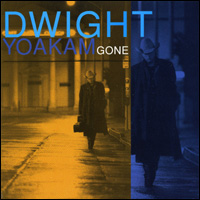
Gone is the sixth studio album by American country music artist Dwight Yoakam, released on October 31, 1995, by Reprise Records. The album peaked at #5 on the Billboard Country Albums chart. It produced three singles on the Billboard Hot Country Songs charts: "Nothing" at #20, "Gone " at #51, and "Sorry You Asked?" at #59. The final single, "Heart of Stone", failed to chart in the United States. This was also the first album of his career not to produce a Top Ten country hit.

A Long Way Home is the ninth studio album by American country music artist Dwight Yoakam, released on June 9, 1998. It reached No. 11 on the Billboard Country Album, with two of its tracks charting on the Hot Country Singles chart. "Things Change" reached No. 17, while "These Arms" peaked at No. 57. Yoakam wrote all the songs on the album himself.
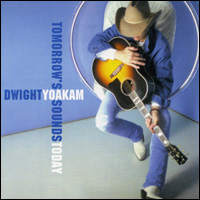
Tomorrow's Sounds Today is the eleventh studio album by American country music artist Dwight Yoakam. This album was released on October 31, 2000. It rose to No. 7 on the Billboard Country Albums chart. There were two charting singles among its tracks: "What Do You Know About Love" at No. 26 and "I Want You to Want Me" at No. 49 on the Hot Country Songs chart. Also included are two duets with Buck Owens, who was a big influence on Yoakam's musical style. It was also Yoakam's last studio album for the Reprise label. After that album's release, Yoakam left Reprise for Warner Bros. in 2001.

Population Me is the 13th studio album by Dwight Yoakam. It was released in June 2003 via the Audium Records label. The album spawned two singles, "The Back of Your Hand" and "The Late Great Golden State".
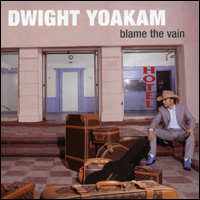
Blame the Vain is the 16th studio album by country music artist Dwight Yoakam, released in June 2005, and his first not to be produced by guitarist producer Pete Anderson. Yoakam wrote all the songs and produced the album himself. He also directed the videos for "Intentional Heartache" and the title track.
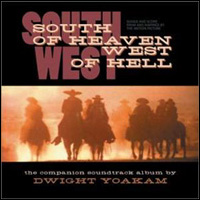
South of Heaven, West of Hell is country singer Dwight Yoakam's 12th studio album, and the first soundtrack album to the motion picture of the same name in which he starred, co-wrote and directed. Yoakam portrays a lawman in the early 1900s in the "wild west" of the Arizona Territory. Half of the tracks in the album are country music tracks. The other tracks are short snippets of straight dialog scenes from the film itself. There are many well-known co-stars in the movie, including Peter Fonda, Bridget Fonda, Paul Reubens, Billy Bob Thornton, Warren Zevon and Vince Vaughn. This was also Yoakam's only album for Warner Bros. after leaving Reprise.
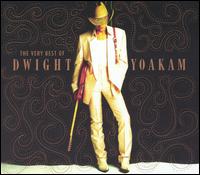
The Very Best of Dwight Yoakam is the third greatest hits compilation album of songs recorded by country music artist Dwight Yoakam. The album comprises twenty hit singles from his career.

Pete Anderson is an American guitarist, music producer, arranger and songwriter.

Dwight Sings Buck is country music artist Dwight Yoakam's 17th studio album, and a tribute album to Buck Owens. The album was released on October 23, 2007, by New West Records.
"Honky-Tonk Man" is a song co-written and recorded by American singer Johnny Horton. It was released in March 1956 as his debut single on Columbia Records, and the album of the same name reaching number 9 on the U.S. country singles charts. Horton re-released the song six years later, taking it to number 11 on the same chart.

dwightyoakamacoustic.net is the tenth studio album released in 2000 by American country music artist Dwight Yoakam. It features 25 of his songs recorded in an acoustic manner, save for "Little Sister" which also features Pete Anderson on electric guitar. The album peaked at #24 on the Billboard Top Country Albums chart and #195 on The Billboard 200.

Just Lookin' for a Hit is the first compilation album by American country music artist Dwight Yoakam. It includes eight singles from his 1980s albums for Reprise Records, as well as two newly recorded cover songs: "Long White Cadillac," originally recorded by The Blasters, and "Sin City," originally recorded by the Flying Burrito Brothers.
"It Won't Hurt" is a song written and recorded by American country music artist Dwight Yoakam. It was released in November 1986 as the third and final single from his debut album Guitars, Cadillacs, Etc., Etc.. While it missed the top 30 on the Billboard Hot Country Songs chart, it became a top ten hit in Canada, peaking at number 7 on the Canadian RPM country singles chart. The song can be heard during the outro to Yoakam's music video for "Honky-Tonk Man".

In Others' Words is a compilation album, and the second covers album by American country music artist Dwight Yoakam. It was released on September 23, 2003 on Reprise Records and peaked at number 59 on the Billboard Top Country Albums chart.

Reprise Please Baby: The Warner Bros. Years is a 2002 box set of songs by American country musician Dwight Yoakam, highlighting his career on Reprise Records and Warner Bros. Records, along with his initial 1981 demos and two new tracks. It has received positive reviews from critics.


















